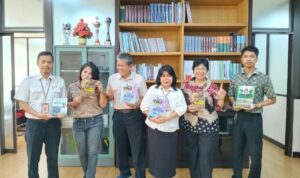The first day of International English Training Class Batch 3, held by VLC-INDONESIA on December 4, 2021 presented by Ms. Neez of LAHA PLV Malaysia. with the topic of ESSENTIAL 21st CENTURY SKILLS FOR STUDENTS.
The presentation well presented. The most interesting issue raised was about CLIL. This issue seems unfamiliar yet to the participants as well as me.
I search thru google about CLIL. and found it from WIKIPEDIA. Below are the meaning of CLIL. May this info is helpful for us to understand about the CLIL clearly
WHAT IS THE CLIL?
The term CLIL was created in 1994 by David Marsh as a methodology similar to but distinct from language immersion and content-based instruction. The idea of its proponents was to create an “umbrella term” which encompasses different forms of using language as the medium of instruction. The methodology has been applied in a business context in many countries and widely accepted as an effective approach. In Italy, for example, it is being used as an accelerated method to teach management concepts in English to business people. Among CLIL’s proponents and practitioners there is Dr Maurizio Morselli, a Human Resources professional and Executive Coach, who believes that “this hybrid immersion approach produces a lot more immediate results and it appeals to self-motivated adult audiences who possess a basic knowledge and understanding of the target language”.
AS A LANGUAGE IMMERSIONS
CLIL is fundamentally based on methodological principles established by research on language immersion. This kind of approach has been identified as very important by the European Commission because: “It can provide effective opportunities for pupils to use their new language skills now, rather than learn them now for later use. It opens doors on languages for a broader range of learners, nurturing self-confidence in young learners and those who have not responded well to formal language instruction in general education. It provides exposure to the language without requiring extra time in the curriculum, which can be of particular interest in vocational settings.” This approach involves learning subjects such as history, geography, managerial skills/concepts or others, through an additional language. It can be very successful in enhancing the learning of languages and other subjects, and helping children develop a positive attitude towards themselves as language learners.
CLIL IN ENGLISH AS INTERNATIONAL LANGUAGE
The integration of content and language learning in English as an international language (EIL) is found in approaches to bilingual education. These approaches include immersion, content-based instruction (CBI), content-based language teaching (CBLT), and the movement towards English medium instruction (EMI). All of these approaches raise a number of questions that a view of English as an international language has for content-integrated approaches (Thompson & McKinley, 2018).
CLIL OBJECTIVES
CLIL objectives are varied, but among the most relevant ones the following can be pointed out (Coyle et al., 2010): To improve the educational system. To establish the necessary conditions that will allow students to achieve the appropriate level of academic performance in CLIL subjects. To improve students’ proficiency in both their mother tongue and the target language, attaching the same importance to each. To develop the intercultural understanding. To develop social and thinking skills.
CLIL advocates claim that this educational approach (Lorenzo et al., 2011): Improves L1 and L2 development. Prepares students for the globalized world. Increases students’ motivation to learn foreign languages. Promotes the learning of a more extensive and varied vocabulary. Enhances students’ confidence in the target language. Improves language competence in the target language, CLIL being more beneficial than traditional foreign language teaching courses. Helps develop intercultural competence.
Well, the CLIL already created since 1994, and we did not aware about it. We just realized when this issue raised by expatriate/s motivator. Hmm at least never too old nor late to learn for earn.
Have a bless day every one







